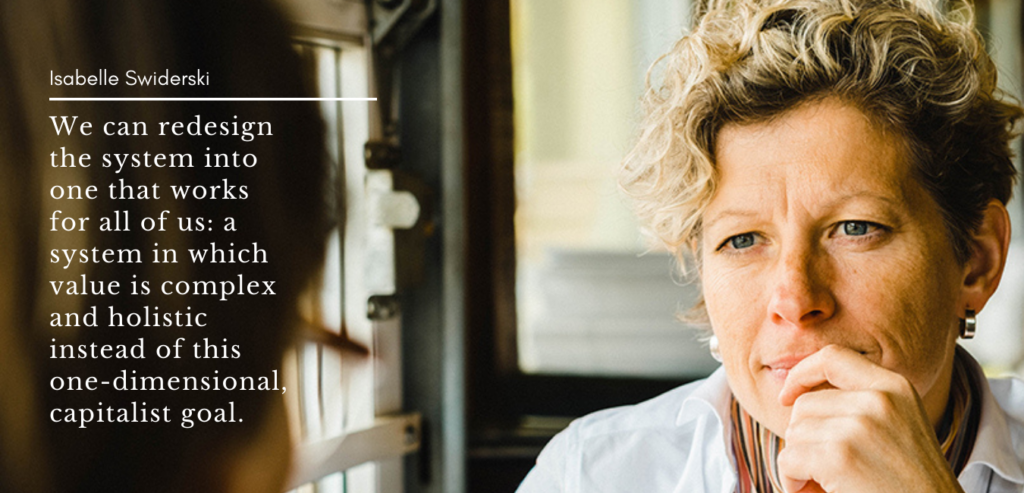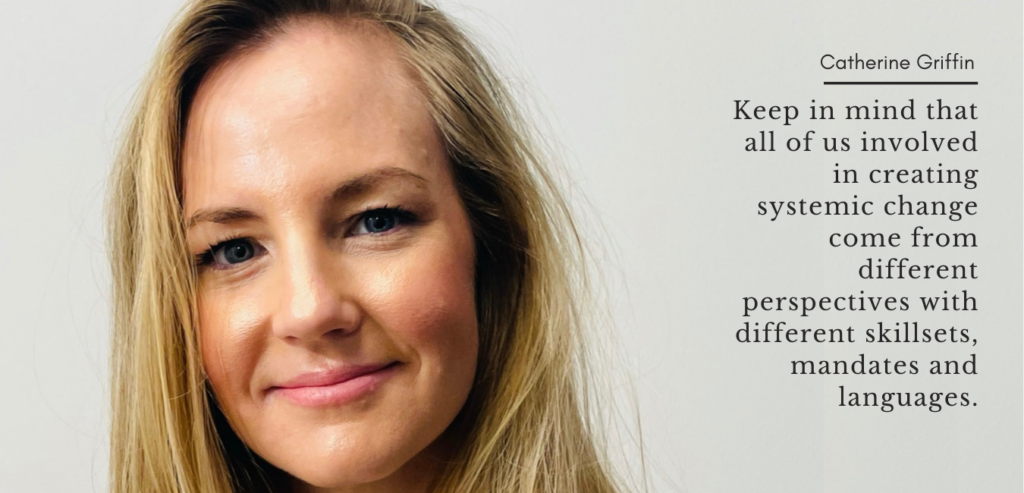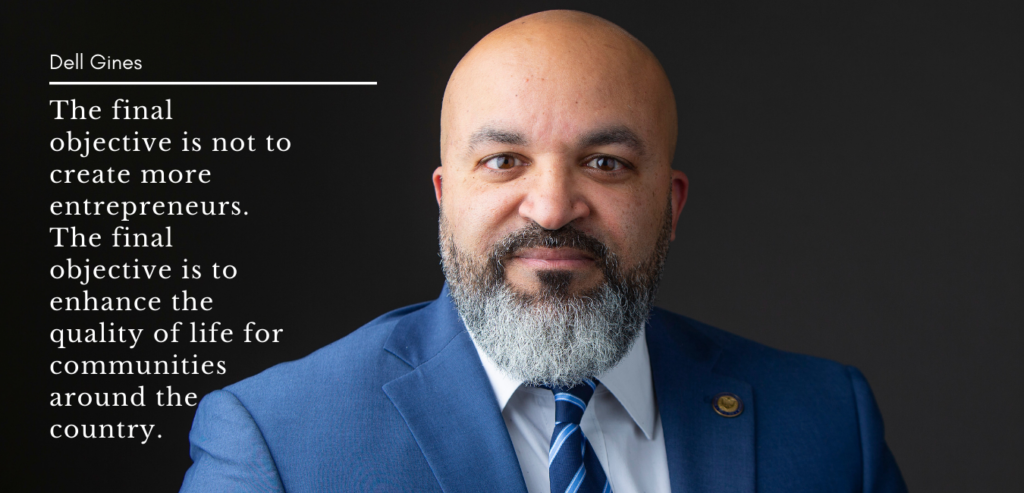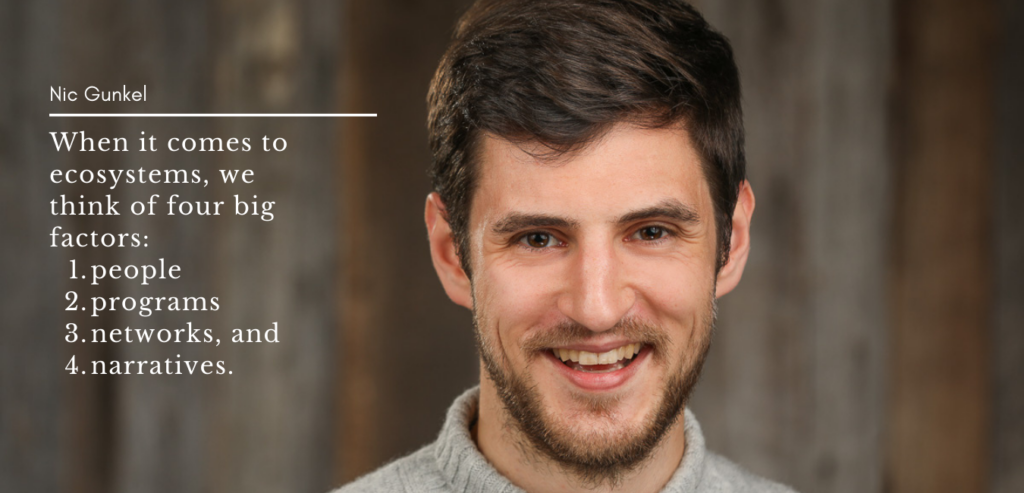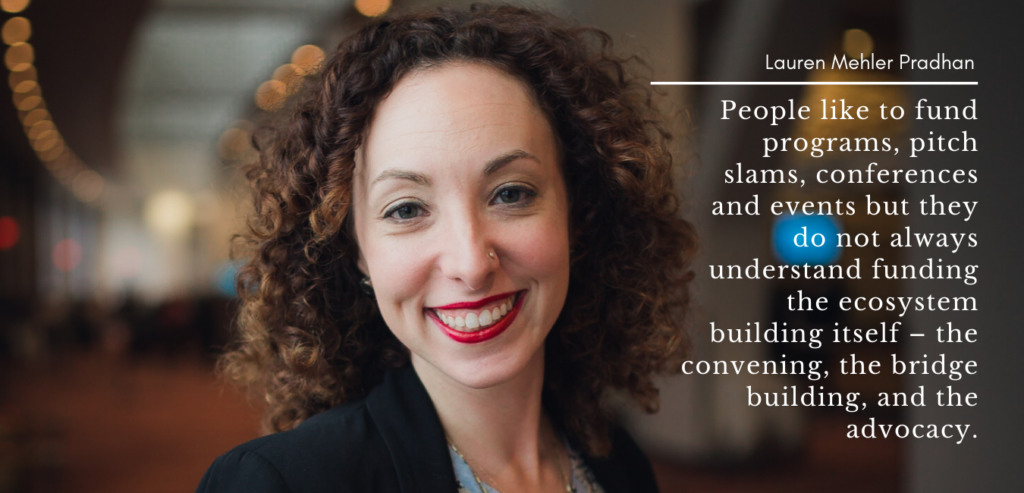
Value: Redefined
Have you ever had a question buried so ferociously in the back of your mind that you couldn’t shake it? A voice that piped up every time you came to a crossroads in your personal or professional life? A sense of this-is-not-how-it’s-supposed-to-be that has sunk its claws so deeply into your psyche that you can’t imagine living without it ever again? That really, you would expect it to start paying rent by now?
I have.
It’s the question of currency in ecosystem building. As servant leaders, we are not driven by monetary incentives for the work we do. Seeing the funding landscape – or lack thereof – you might even think we are attracted by the sheer challenge of creating value from nothing. It’s a little perverse, really.
As much of the recent debate within the ecosystem building community has proven, burnout in our space is real. Ecosystem builders are tired. Not of doing the work. Not of serving their communities. But of being taken for granted and struggling to make ends meet. Now, you might argue that nobody asked us to do this work but in that case, you are missing the point. What is so heartbreaking about these recent developments is that we are losing the very champions and conveners of entrepreneurship in their communities who do the work that very few are skilled and well positioned to do: build onramps, make connections and introductions, provide insights, resources and talent, tell stories and actively contribute to a shared sense of belonging, community and trust. Without these grassroots supporters – cheerleaders, servant leaders, advocates – the rallying cry for founders trails off. If only those with entrepreneurship in their job description show up for founders, entrepreneurship is reduced to a 9-5 office activity. But entrepreneurship happens after hours, on the weekends, at the fringes of our communities, among folks who are often underestimated and mostly overlooked. Without passionate network weavers who go above and beyond to serve entrepreneurs of ALL backgrounds in their communities, entrepreneurship faces a grim future; the field of entrepreneurial ecosystem building decays.
But how do we capture the value of our work? And more importantly, what currency might help us get back on track?
I have personally struggled with proving the value that our work creates, not because it’s squishy and intangible, but because our definition of value is so narrow to capture all the outputs created through entrepreneurial ecosystem building. I am hesitant to write about it because I’m far from having answers. A few of my recent interviews, however, have given me the sense that I am not alone in my dissatisfaction with how we perceive value creation at the intersection of social entrepreneurship and ecosystem building.
Value creation: Oversimplified metrics for complex issues
One of my favorite questions to ask in my conversations for Social Venturers is ‘What’s wrong with the status quo?”. Over and over again, what I hear is the mismatch between the complexity of issues we work to solve versus the oversimplified metrics of finance to measure the value that is created:
Isabelle Swiderski explained, “We have bought into this artificial claim that the financial sector creates the most value, often to the detriment of the real economy. We can redesign the system in more nuanced ways into a system that works for all of us and in which value is complex and holistic instead of this one-dimensional, capitalist goal that is ruining our systems for the majority of people. One prerequisite for all of systemic change is that we must get better at and more comfortable with questioning the current system. Most of us go through life assuming that that is just the way things are. But the status quo and how we see the world are nothing but constructs. If we understand that these constructs can be changed with an entrepreneurial spirit, then we can reimagine better systems.”
Tomas de Lara adds, “The flaw in our current capitalist system is the idea that businesses exist to maximize profits for shareholders and that’s what drives capital markets and stock exchanges. Consequently, companies have adopted the notion that they must do everything in their power (within the law) to maximize value for shareholders. That led to an economic system that runs on the backs of companies under pressure to focus on one single metric: their financial performance as an indicator for value creation. A company’s impact on the environment, their suppliers, their employees and customers, their neighborhoods and the common good is not reflected in this narrow understanding of value. And that’s a problem. Shareholders are one group among many stakeholders that are affected by the operations of a business. If an economy reflects the value created in the marketplace, our understanding of that value needs to become more holistic and nuanced to include stakeholders other than those who hold shares in a company (suppliers, employees, customers, the environment, etc.).”
Bistra Kumbaroska shares, “If money could change the world for better, it already would have. As long as we measure value in GDP, we’re not getting anywhere. I envision a world in which value is not defined by a single metric such as money, but in a holistic view of changemakers that shows our complex nature and our whole selves.”
The system is deeply flawed. We are obsessed with financial metrics to ascribe value to any given activity. In ecosystem building, in particular, funding seems only within reach if you can prove your return on investment in a financial currency. Ideally, you are a nonprofit with minimal overhead cost so that every dollar of funding goes straight into programs. Thank you very much.
Financial metrics have their place
But do not despair. It is not as black and white as it may seem at first.
In January, I kicked off a number of conversations with entrepreneurial ecosystem builders who have made it their mission to dig deeper into the hard numbers of value creation among social entrepreneurs and within the wider context of entrepreneurial ecosystems.
Catherine Griffin of Impactable helps social entrepreneurs translate their outcomes into the macroeconomic context to set the table for a shared conversation: “Keep in mind that all of us involved in creating systemic change come from different perspectives with different skillsets and mandates. There are for-profit entrepreneurs addressing social and environmental challenges, philanthropy, venture capital, entrepreneurship policy, sometimes international development. We all need to come to the table if we really want to move the needle but just imagine how different the languages are that we all speak. To take action toward a shared vision, it is critical that we’re all looking at the same information and agreeing to the same basic terms.”
I would love to find out how to leverage Catherine’s approach to individual ecosystem building efforts to support our work!
Nic Gunkel introduced us to the E3 scorecard that Forward Cities developed to assess the health and level of equity in any given entrepreneurial ecosystem. Nic explains: “When it comes to ecosystems, we think of four big factors:
- people (entrepreneurs, mentors, champions and ecosystem builders)
- programs that allow folks to become active entrepreneurs and places where they meet or bump into each other and have conversations
- networks that create support structures that help businesses thrive, including capital
- narratives that combine data with the identity of an ecosystem.”
Forward Cities is pioneering a wider understanding of value creation through entrepreneurship and I encourage all of us to think along those lines when we describe the value of our work within entrepreneurial ecosystems.
Dell Gines reminds us that – instead of getting swept up in arguments over who creates more value – we should keep our mission front and center:
“The final objective is not to create more entrepreneurs. The final objective is to enhance the quality of life for communities around the country. We’re not creating entrepreneurs for entrepreneurship sake. We use entrepreneurship as an intermediary to get to more sustainable and equitable communities with a higher quality of life and what that means in practice depends on each individual community now, doesn’t it?
The final objective is not to create more entrepreneurs. The final objective is to enhance the quality of life for communities around the country.
Dell Gines
If the objective of ecosystem building and economic development is to increase the quality of life for local communities, we need to first know who is living in those communities and what an increase in quality of life even means. Only then can we choose a strategy, or a combination of strategies, from our portfolio of economic development to see how we might move ahead. And we need the right type of metrics to measure that progress. Job creation and capital investment are not going to cut it.”
Expanding our value definition
We don’t just need these insights to further our field, make the business case for ecosystem building and stand up a support infrastructure to allow us to do this work long-term (though I would call this a phenomenal start!); we OURSELVES need to better understand what value we create. As servant leaders and eternal optimists who work to see their communities thrive, we are notoriously poorly equipped to grasp the value we bring to our communities.
Rooted in purpose
To know what value we bring to our community, our activities need to be deeply aligned with what drives us and why we are in this world. I have written at length about uncovering and getting clear about your purpose (and I offer masterclasses for ecosystem builders to help them peel back the layers of their motivation to find their purpose).
Community appreciation
When we sourced nominations for Unsung Heroes of Ecosystem Building, we were floored by the gratitude and appreciation ecosystem builders from around the nation received from their peers and communities (listen in here).
On the rare occasion that I have connections to the ecosystem of interviewees, I am able to get some feedback about the ecosystem builder in question from the community. This type of appreciation is too rare:
“99% of building a company is having passionate people involved in a supportive community. Todd Nuckols embodies both passion and support for founders. He has been a huge part of what makes Richmond so great for startups.”
“It’s hard to know where to start when talking about the incredible person Larkin is; it’s equally hard to go around Richmond and find a person that hasn’t been impacted by Larkin’s superpower of community building. And that’s really who she is, a superhero. Larkin’s commitment to collaboration is less about simply bringing people together to work together, and more about her desire for everyone to know that true collaboration brings out the best versions of ourselves.”
“Rick is one of the most extraordinary resources that the Portland startup community has. He balances mentorship, advocacy, counseling and ensures that our entire ecosystem thrives. He somehow finds the time to look after all of us. He is an amazing human being.”
Rick Turoczy, arguably, takes the cake when it comes to community appreciation. His ecosystem stood up a Thank You Rick online shop to raise funds for Rick’s work through branded merchandise.
Financial support
Throughout this article I have argued that our narrow focus on money as a single success metric is doing as a disservice. But I would be doing US a disservice to dismiss it altogether. Money or remuneration for our dedication to our communities remains a key ingredient that allows us to do this work sustainably.
Lauren Mehler Pradhan makes this point clear, “People like to fundraise specific programs and elements such as pitch slams, conferences and events but they do not always understand funding the ecosystem building itself – the convening, the bridge building, and the advocacy.”
Yet this is where the true value of community stewardship and systemic change lies. The connections made among entrepreneurs and resources, the advance in trust that a given founder CAN take the leap, the social capital and culture of trust and collaboration that we work so hard to establish and model for others in our communities.
Move the needle
We are not there yet. Building ecosystems for purpose-driven founders to thrive is – when done right – a worthwhile effort that creates a lot of value for entrepreneurs and the communities they serve. It reduces transaction costs and ensures that entrepreneurs have access to the tools, resources and connections they need, when they need them.
Trying to put a salary or any other financial value on this work, however, is difficult for all the reasons I just outlined. I hope we can begin by constantly and always reminding ourselves that the value we and the entrepreneurs create for our communities goes beyond what’s measurable in GDP. Those metrics factor into the equation, but they are merely a glimpse of the full picture.
We must remind ourselves why we do this work (purpose) and remember that we bring value to our communities even if it’s not obvious or easy to assess. I’ll let you in on a secret: I keep thank you notes and emails of appreciation in a dedicated folder. When I feel despair creeping in, I pull them out and remind myself that what we do matters.
But thank you cards – as nice and appreciated as they are – are not enough. Thank you cards don’t pay for events, website hosting and newsletters, nor can we trade them in for countless coffee meetings or time spent connecting actors within the ecosystem. Thank you’s – when they come at all – do not pay the rent. We need national funders and foundations who claim to support entrepreneurship to help pay for field building activities, and the champions who implement them. We need local funders to invest in their communities by investing in their very builders, nurturers and champions.
And the first step on that journey is letting go of the narrow definition of value. The obsession of tying each charitable dollar to a tangible, quantifiable and reportable output (my long and deeply held grudge against the nonprofit sector in general) is doing our entire sector a disservice.
We can lean on some of the existing approaches to widen our understanding of the value created through entrepreneurship and how that translates into the work of entrepreneurial ecosystem building. But keep in mind that metrics are not capable – and not designed – to show the full picture. Metrics give us a tool to compare between different entities across the board, they are designed to oversimplify and make complex issues tangible and comparable. The real world, friends, is more complex than that so keep in mind that there is a lot of grey between the black and white of impact assessment and ecosystem health.
Lastly, keep in mind the end goal of our efforts: To increase the quality of life for our communities through the means of entrepreneurship. Only if we understand who lives in our communities and what an increase in quality of life means to them can we create a tailored approach, rally the troops of co-conspirators and play our part in moving the needle toward these desired outcomes.
Photo by rupixen.com on Unsplash
